 |
My Own Creations
Fokker Dr.I Dreidecker |
 |
|
 |
 |
 |
|
 |
My Own Creations
Fokker Dr.I Dreidecker |
 |
|
 |
 |
 |
|
|
Only 320 Fokker
Dr.I triplanes were built. Despite this small number the Dr.I is one
of the most famous fighters of all time because Freiherr
Manfred von Richthofen, also known as "The Red Baron" flew one when
he was shot down on April 21st 1918. He was the highest scoring ace during
the First World War. He got his nickname from this, his most famous mount:
a blood red Fokker Dr.I. The reason for red being chosen for aces stems
from the fact that red dye was the most expensive during the first World
War. Ironically he only made a few of his 80 victories in a Fokker Dr.I.
The Fokker Company built a number of outstanding airplanes during the first world war. In May 1917 Fokker saw the Sopwith Triplane in action and ordered his chief designer Reinhold Platz to make a similar machine. Despite the outward similarity with the Sopwith Triplane the Dr.I was constructed with typical Fokker features such as the wing fairing between the landing wheels. The fuselage was made of welded steel tube while the wings were almost entirely of wood. With it's small size, light weight and good upward visibility, the Dr.I was an outstanding dogfighter. While not as fast, the Dr.I could easily outclimb and outmaneuver any contemporary biplane. I was getting tired of building biplanes using mainly tan, grey and black pieces. And what could be better than to make a totally red triplane! This is the first model I have made that had to look like the real thing. To do that I reluctantly made cuts in 6 pieces. The 6615 Eagle Stunt Flyer was an good starting point for this project. |
|||||||||||||||||||
|
|
||||||||||||||||||||
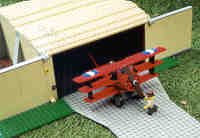 |
Leaving the hangar
Slyboots has found a Fokker Dr.I hidden from the IACC in a small abandoned hangar at a remote airfield. While repairing it he got the idea to paint it just like von Richthofen's |
|||||||||||||||||||
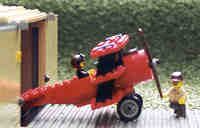 |
"Contact"
Getting ready for take off. The engine is started with the triplane barely out of the hangar |
|||||||||||||||||||
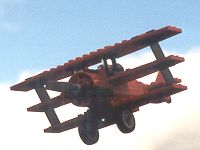 |
Test flight
Slyboots puts the Fokker Dr.I through it's paces |
|||||||||||||||||||
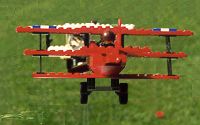 |
Shallow dive
(or chasing the Venture Venom at low level over a green field) Slyboots has used the excellent maneuverability of the Dr.I to get into a favorable position |
|||||||||||||||||||
 |
Front view
The engine is a cogwheel from the 1970'ies. Fortunately a Technic axle fit this predecessor to Technic. The cogwheels came with metal axles that tapered to a pin that fitted in the 2x4 bricks with small wheel holders on all four sides. Note how the wing mid-section is supported by a couple of clear 1x2 L-shaped panels |
 |
||||||||||||||||||
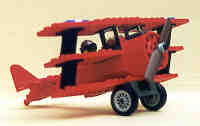 |
On the ground
The engine is also visible in this picture. The slick tires are also from the 1970'ies |
|||||||||||||||||||
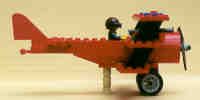 |
Right side view
This clearly shows the tail skid made of a 2x2 Plate with towball. I think this is the best way to make a tail skid. Also visible are the modified interplane struts |
 |
||||||||||||||||||
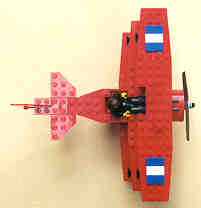 |
Top view
This demonstrates the excellent upward visibility. I don't know why Slyboots painted the white and blue stripes on the wings. If you look carefully you can see the small cut in the 2x2 plate just in front of the rudder |
|||||||||||||||||||
|
|
||||||||||||||||||||
| Blueprint | Technical Specifications | |||||||||||||||||||
 |
|
|||||||||||||||||||